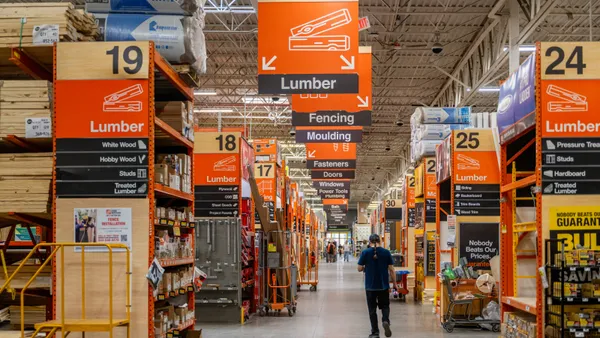Dive Brief:
- Adidas is managing inventory and supplier relations to end the year with "healthy and reasonable inventory," while attempting to preserve long-term supplier relationships, executives detailed on a Monday earnings call.
- Adidas will pay supplier cancellation fees up to "high double-digit million" euros to decrease the amount of inventory coming into its warehouses, executives said. The cancellation fees account for two percentage points of gross margin loss in the first quarter.
- Adidas is shifting focus to e-commerce, because brick and mortar business has eroded, causing inventories to balloon 36% at the end of the first quarter, compared to the same period last year. Quarterly revenue declined 19%. The company will shift inventory previously allocated for wholesale to e-commerce and lean heavily on its outlet store network, executives said.
Dive Insight:
Adidas listed "supply chain responsibility" among its three priorities in the wake of COVID-19 disruptions to both retail and supply chains — along with financial viability, and health and safety.
"We have a deep responsibility for the extended supply chain to ensure that they will be around when the crisis" ends, CEO Kasper Rorsted said on the call, adding that 85% of Adidas' supply chain relationships have been in place for at least 10 years.
To manage inventory amidst cratered demand, Adidas has canceled some orders, postponed others and opted to hold some unreleased stock until 2021.The canceled orders, product takebacks in Greater China, and an increase in bad debt allowances combined for a 250 million euro ($271 million) hit to the company's profit during the first quarter, the company said.
Adidas worked with 631 factories in 52 countries at the end of 2019, 69% of which are in Asia, according to its 2019 annual report. The company intends to consolidate its sourcing in the future to be able to provide fewer factories with more orders, according to the report.
The health of the garment manufacturing industry is of concern to some stakeholders, as canceled orders and expected issues of deferred payment threaten economies heavily dependent on manufacturing, such as Bangladesh. CFO Harm Ohlemey said the company is working with suppliers so that the relationships "stay healthy on both sides."
Operational costs related to order jostling and physical operations during the pandemic are new in their details, but Adidas had an operationally tough year in 2019 when the company sacrificed 3% to 4% in topline growth due to "supply chain shortages," which mainly affected the North American market. CFO Harm Ohlemey said that the current supply chain challenges affecting the North American market are comparable.














